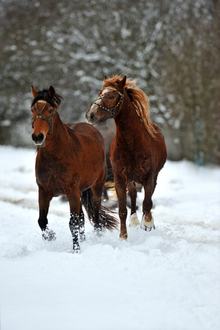Many horse owners travel during the holidays and leaving their horse or horses can pose both emotional and logistical worries. Leaving your horses in the care of others takes thoughtful planning and preparation to make sure that horses are well taken care of, and that no health problems develop because of a changing schedule.

Horses and holiday planning
Horse owners need to do holiday planning in such a way that it causes as little disruption to the horse's feeding routine as possible to prevent colic.
It's important to be well organized before leaving your horses in the care of others, so that you don't worry about them while you are away. As you well know, worrying can affect your enjoyment of the holidays.
Horses love routine, and the ultimate routine centers around meal times. It's the highlight of every horse's day and the last thing they want is some pesky horse sitter coming in and messing with their favorite ritual..
Horse owners need to do holiday planning in such a way that it causes as little disruption to the horse's feeding routine as possible. The last thing you want to do is introduce a radical feed change just as you depart. As horse owners know, a sudden feed change can trigger potentially fatal colic.
Feed changes need to be introduced gradually, so if your horse's diet must change during your absence, introduce them gradually to the new feed regime in the weeks before you go. Timing is important, too. If, for example, you feed your horses late-afternoon and your horse sitter can only do it in the morning, gradually move your horses to a morning-feed routine.
The second crucial area is having a game plan in place to cover illness or injury. If you cannot be contacted while away, it's essential you formally leave someone to make potentially crucial decisions about your horse's wellbeing. The last thing you want to do is leave a vet second-guessing whether you would consent to urgent life-saving surgery.
You actually have obligations to two parties in organizing your holiday horse care. You naturally are obliged to continue to provide a safe and caring environment for your horses. But you're also obligated to provide your horse caregiver with all the tools and information necessary to do the job.
First of all, are you up-to-date with any farriery work? If your horse is shod, is it best for you to remove their shoes before you go away?
If you've been intending to call the dentist or any other health professional, get them in and get the necessary work out of the way before leaving for your holiday.
Let your veterinarian know you will be away. Make it clear to him or her that you will meet any costs associated with veterinary care should a call-out prove necessary. Depending on your relationship with your vet, you may need to do this in writing.
It's a grim thought, but you should outline in writing the circumstances in which you feel euthanasia would be the best option. For example, some horse owners will draw the line at surgery to tackle a serious case of colic.
Then again, you might be comfortable about surgery, but only for your younger horses. You may not, for example, feel it's the best course of action for the geriatric members of your herd.
This letter could be placed on your file at the clinic, but you should leave a signed copy with your horse caregiver.
The letter should also have any insurance requirements outlined, to ensure all conditions are met in the case of any decision to euthanize.
It's best to leave a letter even if you expect you'll be in phone contact for your entire holiday. It would be terrible to think a horse might be suffering unnecessarily for several hours just because you happen to be on a boat cruise or where you can't be reached for a period of time.
With a little planning and organization, you can have peace of mind and rest assured that your horses will be well taken care of while you are away. In fact, a good horse sitter, whether a neighbor, a friend, a relative, or a professional may keep your horses so happy that they won't miss you at all.
